Analyzing Organizational Behavior: Royal Dutch Shell's Perspective
VerifiedAdded on 2020/07/22
|12
|3887
|226
Report
AI Summary
This report provides a comprehensive analysis of organizational behavior within Royal Dutch Shell Plc, focusing on how culture, politics, and power dynamics influence individual and team performance. It examines the impact of these factors on employee behavior and evaluates the effectiveness of content and process theories of motivation, along with motivational techniques employed by the company. The report also includes a reflective statement using the Gibbs model to differentiate between effective and ineffective teams within the organization. Furthermore, it explores the application of organizational behavior concepts in the context of a 'new product development team,' offering insights into leadership, management, and employee engagement strategies used by Royal Dutch Shell to achieve its goals. The analysis draws on various theories and real-world examples to provide a detailed understanding of the company's approach to organizational behavior.
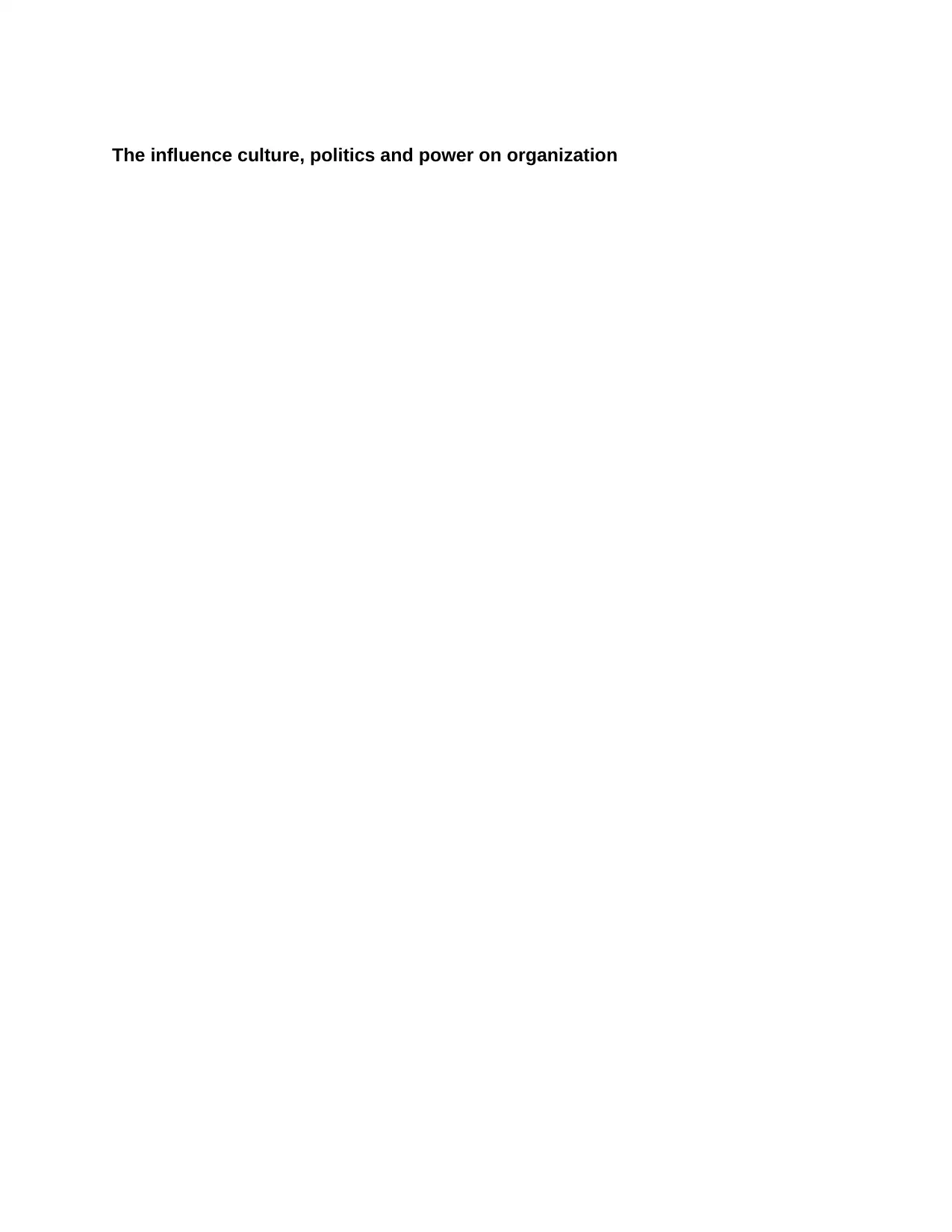
The influence culture, politics and power on organization
Paraphrase This Document
Need a fresh take? Get an instant paraphrase of this document with our AI Paraphraser
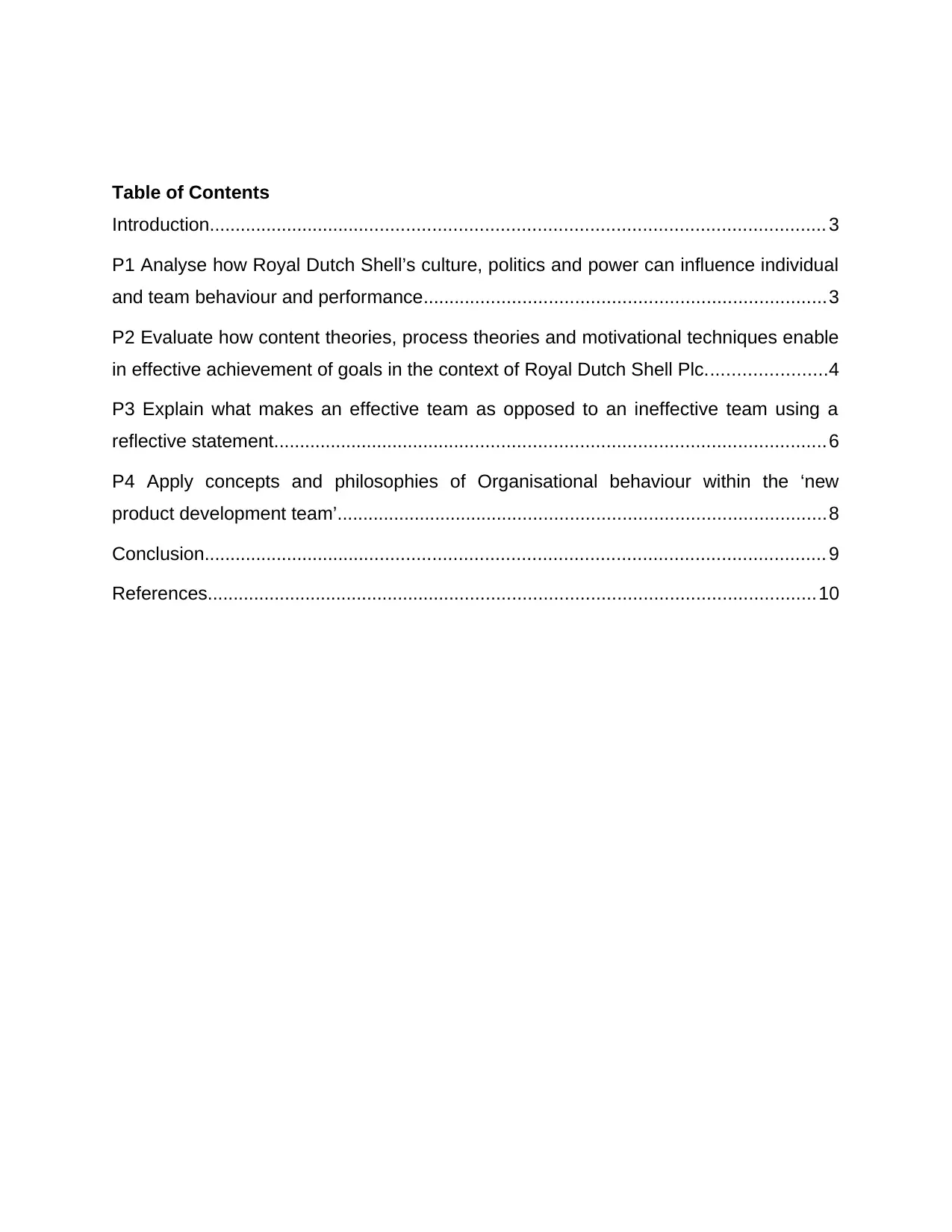
Table of Contents
Introduction...................................................................................................................... 3
P1 Analyse how Royal Dutch Shell’s culture, politics and power can influence individual
and team behaviour and performance.............................................................................3
P2 Evaluate how content theories, process theories and motivational techniques enable
in effective achievement of goals in the context of Royal Dutch Shell Plc.......................4
P3 Explain what makes an effective team as opposed to an ineffective team using a
reflective statement..........................................................................................................6
P4 Apply concepts and philosophies of Organisational behaviour within the ‘new
product development team’..............................................................................................8
Conclusion....................................................................................................................... 9
References.....................................................................................................................10
Introduction...................................................................................................................... 3
P1 Analyse how Royal Dutch Shell’s culture, politics and power can influence individual
and team behaviour and performance.............................................................................3
P2 Evaluate how content theories, process theories and motivational techniques enable
in effective achievement of goals in the context of Royal Dutch Shell Plc.......................4
P3 Explain what makes an effective team as opposed to an ineffective team using a
reflective statement..........................................................................................................6
P4 Apply concepts and philosophies of Organisational behaviour within the ‘new
product development team’..............................................................................................8
Conclusion....................................................................................................................... 9
References.....................................................................................................................10
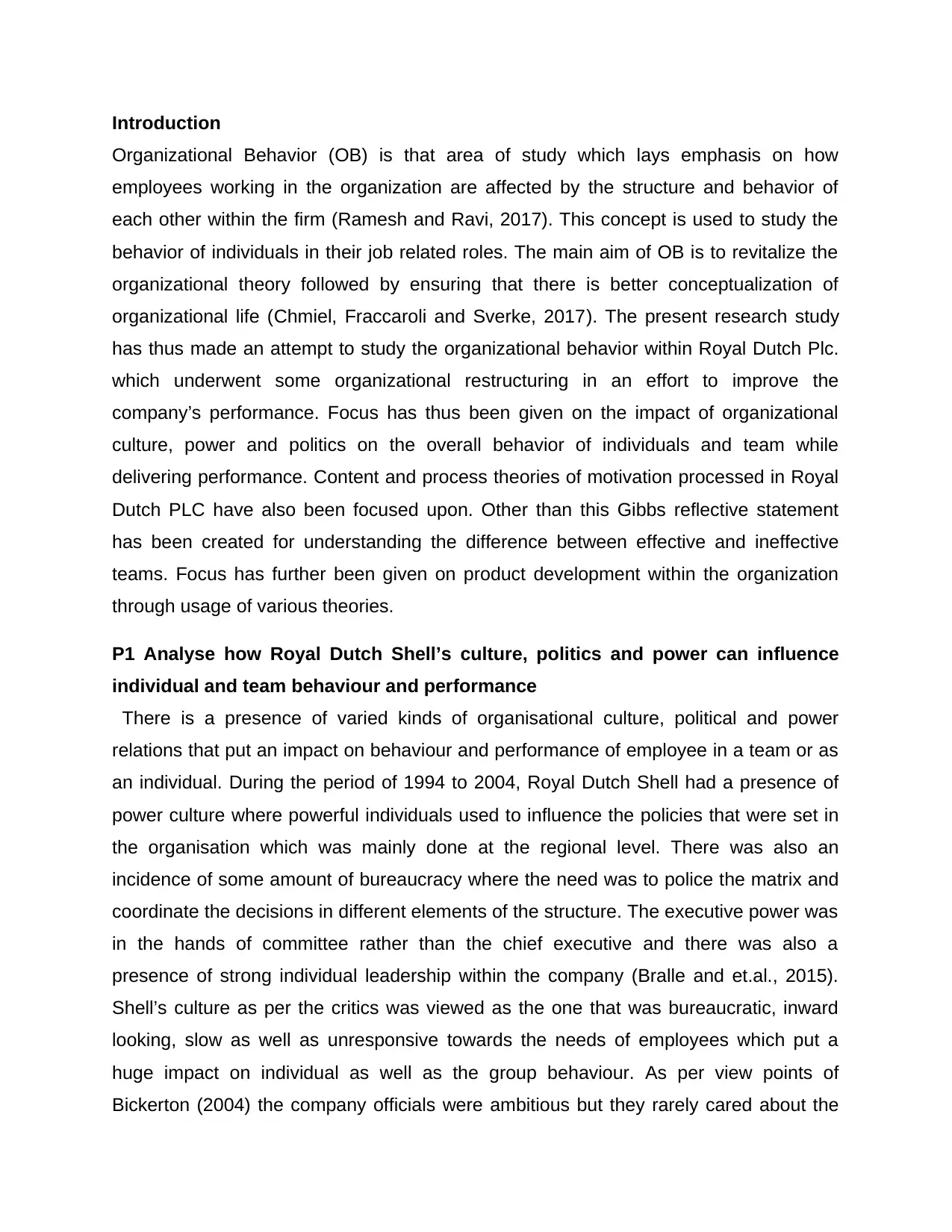
Introduction
Organizational Behavior (OB) is that area of study which lays emphasis on how
employees working in the organization are affected by the structure and behavior of
each other within the firm (Ramesh and Ravi, 2017). This concept is used to study the
behavior of individuals in their job related roles. The main aim of OB is to revitalize the
organizational theory followed by ensuring that there is better conceptualization of
organizational life (Chmiel, Fraccaroli and Sverke, 2017). The present research study
has thus made an attempt to study the organizational behavior within Royal Dutch Plc.
which underwent some organizational restructuring in an effort to improve the
company’s performance. Focus has thus been given on the impact of organizational
culture, power and politics on the overall behavior of individuals and team while
delivering performance. Content and process theories of motivation processed in Royal
Dutch PLC have also been focused upon. Other than this Gibbs reflective statement
has been created for understanding the difference between effective and ineffective
teams. Focus has further been given on product development within the organization
through usage of various theories.
P1 Analyse how Royal Dutch Shell’s culture, politics and power can influence
individual and team behaviour and performance
There is a presence of varied kinds of organisational culture, political and power
relations that put an impact on behaviour and performance of employee in a team or as
an individual. During the period of 1994 to 2004, Royal Dutch Shell had a presence of
power culture where powerful individuals used to influence the policies that were set in
the organisation which was mainly done at the regional level. There was also an
incidence of some amount of bureaucracy where the need was to police the matrix and
coordinate the decisions in different elements of the structure. The executive power was
in the hands of committee rather than the chief executive and there was also a
presence of strong individual leadership within the company (Bralle and et.al., 2015).
Shell’s culture as per the critics was viewed as the one that was bureaucratic, inward
looking, slow as well as unresponsive towards the needs of employees which put a
huge impact on individual as well as the group behaviour. As per view points of
Bickerton (2004) the company officials were ambitious but they rarely cared about the
Organizational Behavior (OB) is that area of study which lays emphasis on how
employees working in the organization are affected by the structure and behavior of
each other within the firm (Ramesh and Ravi, 2017). This concept is used to study the
behavior of individuals in their job related roles. The main aim of OB is to revitalize the
organizational theory followed by ensuring that there is better conceptualization of
organizational life (Chmiel, Fraccaroli and Sverke, 2017). The present research study
has thus made an attempt to study the organizational behavior within Royal Dutch Plc.
which underwent some organizational restructuring in an effort to improve the
company’s performance. Focus has thus been given on the impact of organizational
culture, power and politics on the overall behavior of individuals and team while
delivering performance. Content and process theories of motivation processed in Royal
Dutch PLC have also been focused upon. Other than this Gibbs reflective statement
has been created for understanding the difference between effective and ineffective
teams. Focus has further been given on product development within the organization
through usage of various theories.
P1 Analyse how Royal Dutch Shell’s culture, politics and power can influence
individual and team behaviour and performance
There is a presence of varied kinds of organisational culture, political and power
relations that put an impact on behaviour and performance of employee in a team or as
an individual. During the period of 1994 to 2004, Royal Dutch Shell had a presence of
power culture where powerful individuals used to influence the policies that were set in
the organisation which was mainly done at the regional level. There was also an
incidence of some amount of bureaucracy where the need was to police the matrix and
coordinate the decisions in different elements of the structure. The executive power was
in the hands of committee rather than the chief executive and there was also a
presence of strong individual leadership within the company (Bralle and et.al., 2015).
Shell’s culture as per the critics was viewed as the one that was bureaucratic, inward
looking, slow as well as unresponsive towards the needs of employees which put a
huge impact on individual as well as the group behaviour. As per view points of
Bickerton (2004) the company officials were ambitious but they rarely cared about the
⊘ This is a preview!⊘
Do you want full access?
Subscribe today to unlock all pages.

Trusted by 1+ million students worldwide
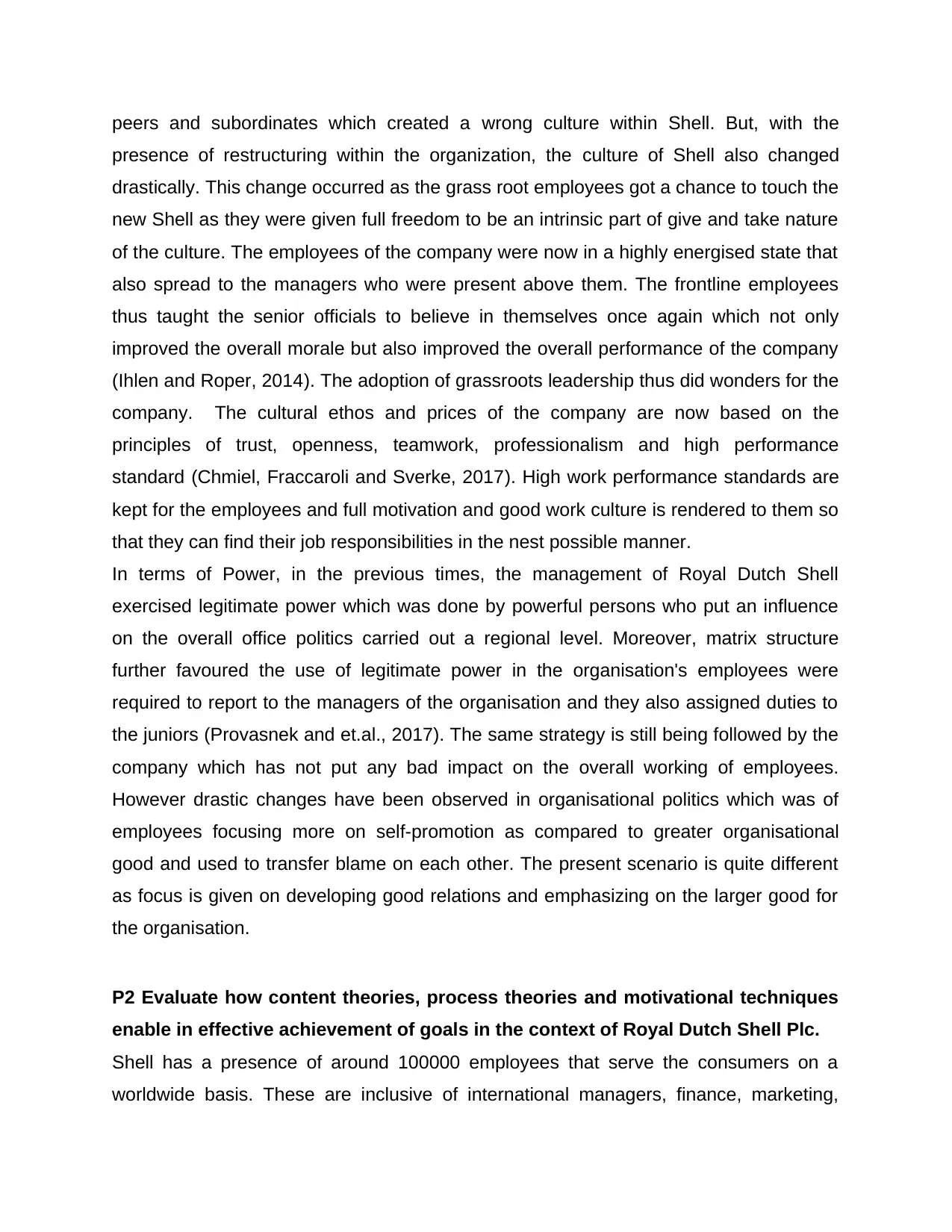
peers and subordinates which created a wrong culture within Shell. But, with the
presence of restructuring within the organization, the culture of Shell also changed
drastically. This change occurred as the grass root employees got a chance to touch the
new Shell as they were given full freedom to be an intrinsic part of give and take nature
of the culture. The employees of the company were now in a highly energised state that
also spread to the managers who were present above them. The frontline employees
thus taught the senior officials to believe in themselves once again which not only
improved the overall morale but also improved the overall performance of the company
(Ihlen and Roper, 2014). The adoption of grassroots leadership thus did wonders for the
company. The cultural ethos and prices of the company are now based on the
principles of trust, openness, teamwork, professionalism and high performance
standard (Chmiel, Fraccaroli and Sverke, 2017). High work performance standards are
kept for the employees and full motivation and good work culture is rendered to them so
that they can find their job responsibilities in the nest possible manner.
In terms of Power, in the previous times, the management of Royal Dutch Shell
exercised legitimate power which was done by powerful persons who put an influence
on the overall office politics carried out a regional level. Moreover, matrix structure
further favoured the use of legitimate power in the organisation's employees were
required to report to the managers of the organisation and they also assigned duties to
the juniors (Provasnek and et.al., 2017). The same strategy is still being followed by the
company which has not put any bad impact on the overall working of employees.
However drastic changes have been observed in organisational politics which was of
employees focusing more on self-promotion as compared to greater organisational
good and used to transfer blame on each other. The present scenario is quite different
as focus is given on developing good relations and emphasizing on the larger good for
the organisation.
P2 Evaluate how content theories, process theories and motivational techniques
enable in effective achievement of goals in the context of Royal Dutch Shell Plc.
Shell has a presence of around 100000 employees that serve the consumers on a
worldwide basis. These are inclusive of international managers, finance, marketing,
presence of restructuring within the organization, the culture of Shell also changed
drastically. This change occurred as the grass root employees got a chance to touch the
new Shell as they were given full freedom to be an intrinsic part of give and take nature
of the culture. The employees of the company were now in a highly energised state that
also spread to the managers who were present above them. The frontline employees
thus taught the senior officials to believe in themselves once again which not only
improved the overall morale but also improved the overall performance of the company
(Ihlen and Roper, 2014). The adoption of grassroots leadership thus did wonders for the
company. The cultural ethos and prices of the company are now based on the
principles of trust, openness, teamwork, professionalism and high performance
standard (Chmiel, Fraccaroli and Sverke, 2017). High work performance standards are
kept for the employees and full motivation and good work culture is rendered to them so
that they can find their job responsibilities in the nest possible manner.
In terms of Power, in the previous times, the management of Royal Dutch Shell
exercised legitimate power which was done by powerful persons who put an influence
on the overall office politics carried out a regional level. Moreover, matrix structure
further favoured the use of legitimate power in the organisation's employees were
required to report to the managers of the organisation and they also assigned duties to
the juniors (Provasnek and et.al., 2017). The same strategy is still being followed by the
company which has not put any bad impact on the overall working of employees.
However drastic changes have been observed in organisational politics which was of
employees focusing more on self-promotion as compared to greater organisational
good and used to transfer blame on each other. The present scenario is quite different
as focus is given on developing good relations and emphasizing on the larger good for
the organisation.
P2 Evaluate how content theories, process theories and motivational techniques
enable in effective achievement of goals in the context of Royal Dutch Shell Plc.
Shell has a presence of around 100000 employees that serve the consumers on a
worldwide basis. These are inclusive of international managers, finance, marketing,
Paraphrase This Document
Need a fresh take? Get an instant paraphrase of this document with our AI Paraphraser
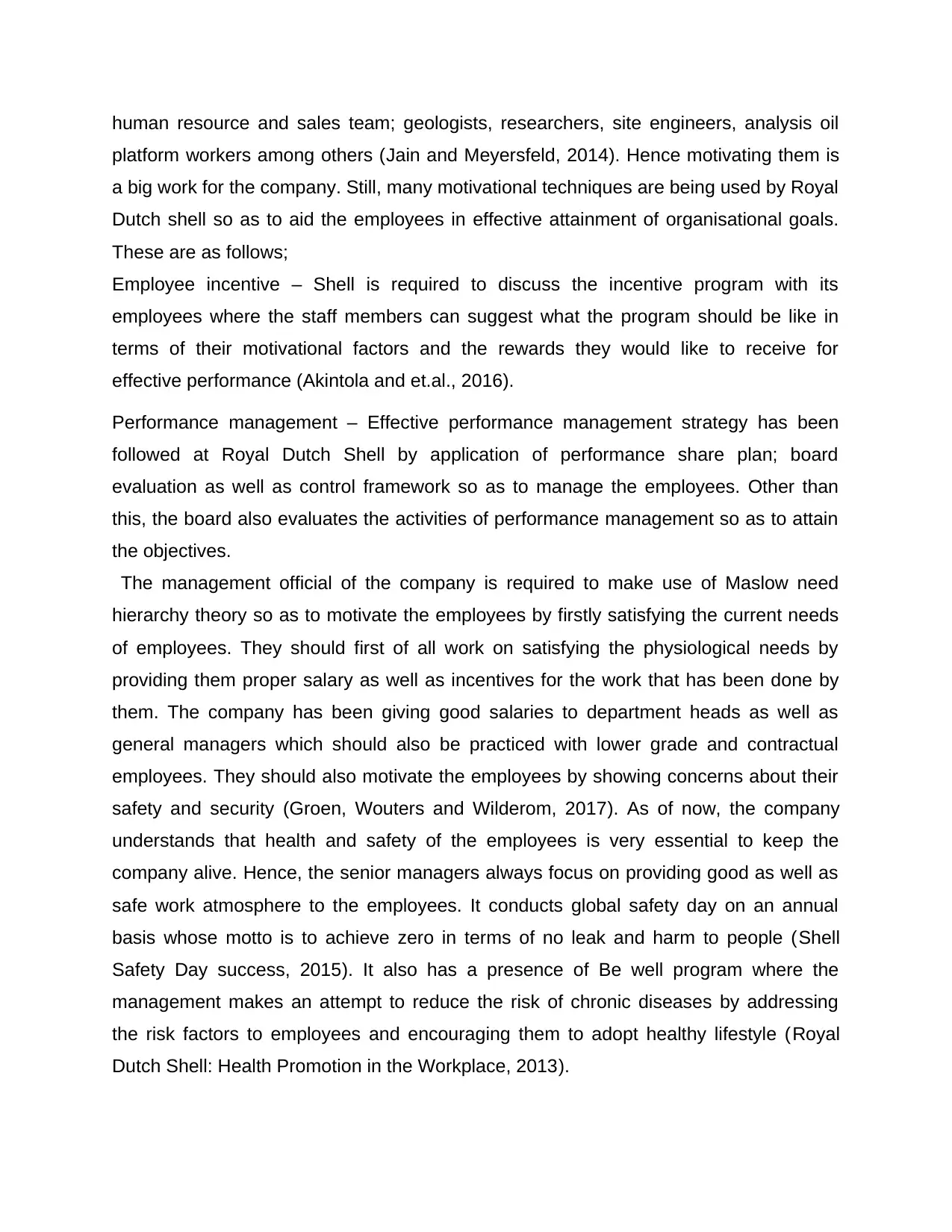
human resource and sales team; geologists, researchers, site engineers, analysis oil
platform workers among others (Jain and Meyersfeld, 2014). Hence motivating them is
a big work for the company. Still, many motivational techniques are being used by Royal
Dutch shell so as to aid the employees in effective attainment of organisational goals.
These are as follows;
Employee incentive – Shell is required to discuss the incentive program with its
employees where the staff members can suggest what the program should be like in
terms of their motivational factors and the rewards they would like to receive for
effective performance (Akintola and et.al., 2016).
Performance management – Effective performance management strategy has been
followed at Royal Dutch Shell by application of performance share plan; board
evaluation as well as control framework so as to manage the employees. Other than
this, the board also evaluates the activities of performance management so as to attain
the objectives.
The management official of the company is required to make use of Maslow need
hierarchy theory so as to motivate the employees by firstly satisfying the current needs
of employees. They should first of all work on satisfying the physiological needs by
providing them proper salary as well as incentives for the work that has been done by
them. The company has been giving good salaries to department heads as well as
general managers which should also be practiced with lower grade and contractual
employees. They should also motivate the employees by showing concerns about their
safety and security (Groen, Wouters and Wilderom, 2017). As of now, the company
understands that health and safety of the employees is very essential to keep the
company alive. Hence, the senior managers always focus on providing good as well as
safe work atmosphere to the employees. It conducts global safety day on an annual
basis whose motto is to achieve zero in terms of no leak and harm to people (Shell
Safety Day success, 2015). It also has a presence of Be well program where the
management makes an attempt to reduce the risk of chronic diseases by addressing
the risk factors to employees and encouraging them to adopt healthy lifestyle (Royal
Dutch Shell: Health Promotion in the Workplace, 2013).
platform workers among others (Jain and Meyersfeld, 2014). Hence motivating them is
a big work for the company. Still, many motivational techniques are being used by Royal
Dutch shell so as to aid the employees in effective attainment of organisational goals.
These are as follows;
Employee incentive – Shell is required to discuss the incentive program with its
employees where the staff members can suggest what the program should be like in
terms of their motivational factors and the rewards they would like to receive for
effective performance (Akintola and et.al., 2016).
Performance management – Effective performance management strategy has been
followed at Royal Dutch Shell by application of performance share plan; board
evaluation as well as control framework so as to manage the employees. Other than
this, the board also evaluates the activities of performance management so as to attain
the objectives.
The management official of the company is required to make use of Maslow need
hierarchy theory so as to motivate the employees by firstly satisfying the current needs
of employees. They should first of all work on satisfying the physiological needs by
providing them proper salary as well as incentives for the work that has been done by
them. The company has been giving good salaries to department heads as well as
general managers which should also be practiced with lower grade and contractual
employees. They should also motivate the employees by showing concerns about their
safety and security (Groen, Wouters and Wilderom, 2017). As of now, the company
understands that health and safety of the employees is very essential to keep the
company alive. Hence, the senior managers always focus on providing good as well as
safe work atmosphere to the employees. It conducts global safety day on an annual
basis whose motto is to achieve zero in terms of no leak and harm to people (Shell
Safety Day success, 2015). It also has a presence of Be well program where the
management makes an attempt to reduce the risk of chronic diseases by addressing
the risk factors to employees and encouraging them to adopt healthy lifestyle (Royal
Dutch Shell: Health Promotion in the Workplace, 2013).
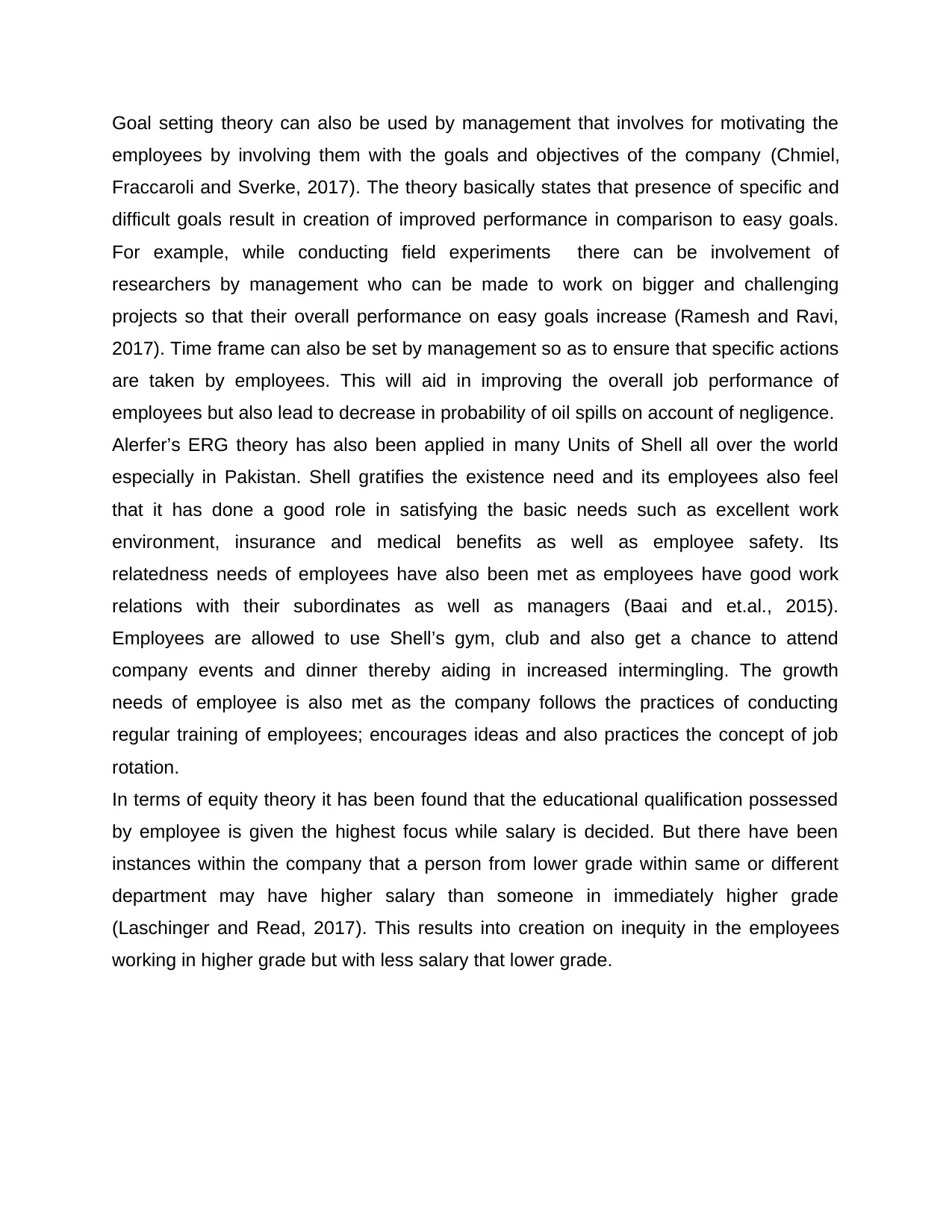
Goal setting theory can also be used by management that involves for motivating the
employees by involving them with the goals and objectives of the company (Chmiel,
Fraccaroli and Sverke, 2017). The theory basically states that presence of specific and
difficult goals result in creation of improved performance in comparison to easy goals.
For example, while conducting field experiments there can be involvement of
researchers by management who can be made to work on bigger and challenging
projects so that their overall performance on easy goals increase (Ramesh and Ravi,
2017). Time frame can also be set by management so as to ensure that specific actions
are taken by employees. This will aid in improving the overall job performance of
employees but also lead to decrease in probability of oil spills on account of negligence.
Alerfer’s ERG theory has also been applied in many Units of Shell all over the world
especially in Pakistan. Shell gratifies the existence need and its employees also feel
that it has done a good role in satisfying the basic needs such as excellent work
environment, insurance and medical benefits as well as employee safety. Its
relatedness needs of employees have also been met as employees have good work
relations with their subordinates as well as managers (Baai and et.al., 2015).
Employees are allowed to use Shell’s gym, club and also get a chance to attend
company events and dinner thereby aiding in increased intermingling. The growth
needs of employee is also met as the company follows the practices of conducting
regular training of employees; encourages ideas and also practices the concept of job
rotation.
In terms of equity theory it has been found that the educational qualification possessed
by employee is given the highest focus while salary is decided. But there have been
instances within the company that a person from lower grade within same or different
department may have higher salary than someone in immediately higher grade
(Laschinger and Read, 2017). This results into creation on inequity in the employees
working in higher grade but with less salary that lower grade.
employees by involving them with the goals and objectives of the company (Chmiel,
Fraccaroli and Sverke, 2017). The theory basically states that presence of specific and
difficult goals result in creation of improved performance in comparison to easy goals.
For example, while conducting field experiments there can be involvement of
researchers by management who can be made to work on bigger and challenging
projects so that their overall performance on easy goals increase (Ramesh and Ravi,
2017). Time frame can also be set by management so as to ensure that specific actions
are taken by employees. This will aid in improving the overall job performance of
employees but also lead to decrease in probability of oil spills on account of negligence.
Alerfer’s ERG theory has also been applied in many Units of Shell all over the world
especially in Pakistan. Shell gratifies the existence need and its employees also feel
that it has done a good role in satisfying the basic needs such as excellent work
environment, insurance and medical benefits as well as employee safety. Its
relatedness needs of employees have also been met as employees have good work
relations with their subordinates as well as managers (Baai and et.al., 2015).
Employees are allowed to use Shell’s gym, club and also get a chance to attend
company events and dinner thereby aiding in increased intermingling. The growth
needs of employee is also met as the company follows the practices of conducting
regular training of employees; encourages ideas and also practices the concept of job
rotation.
In terms of equity theory it has been found that the educational qualification possessed
by employee is given the highest focus while salary is decided. But there have been
instances within the company that a person from lower grade within same or different
department may have higher salary than someone in immediately higher grade
(Laschinger and Read, 2017). This results into creation on inequity in the employees
working in higher grade but with less salary that lower grade.
⊘ This is a preview!⊘
Do you want full access?
Subscribe today to unlock all pages.

Trusted by 1+ million students worldwide
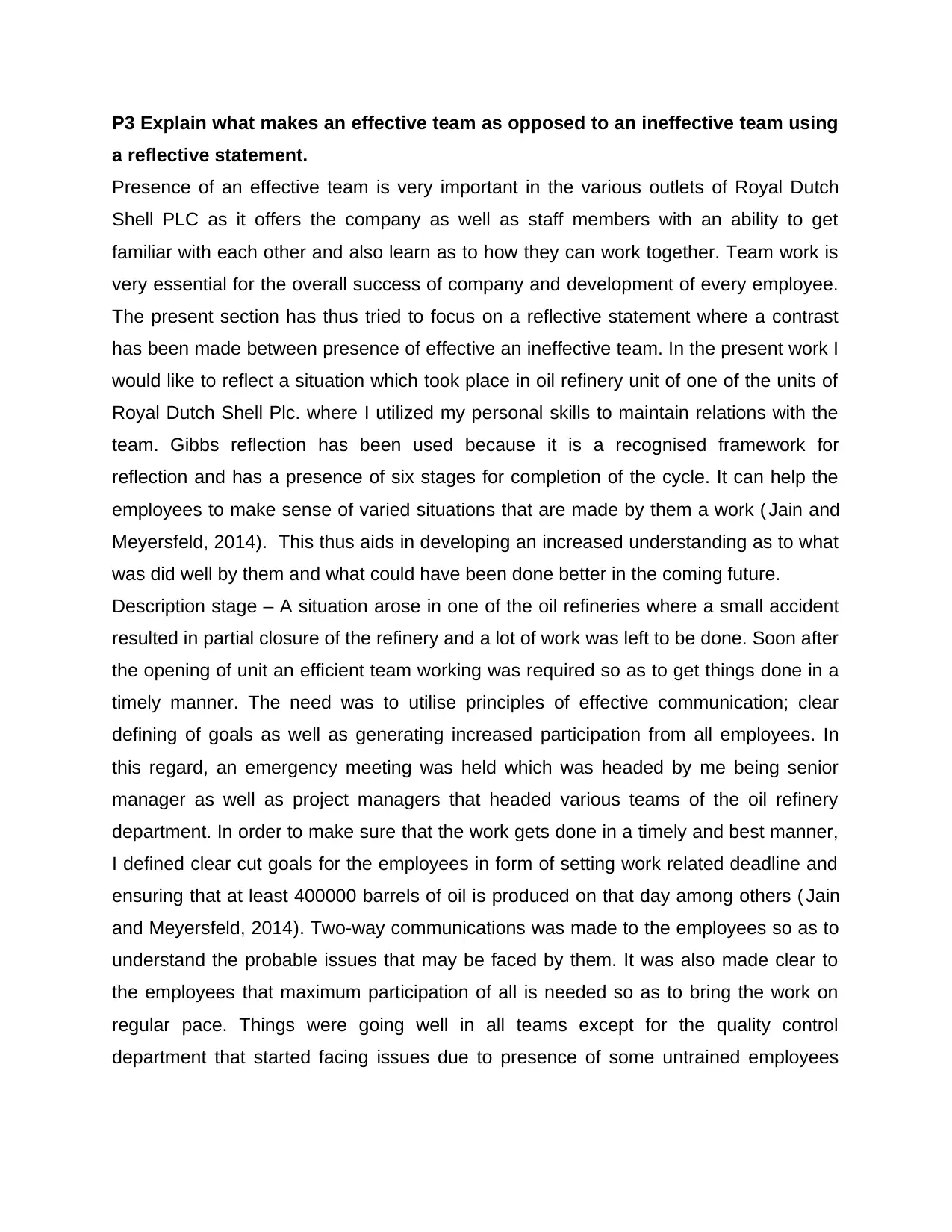
P3 Explain what makes an effective team as opposed to an ineffective team using
a reflective statement.
Presence of an effective team is very important in the various outlets of Royal Dutch
Shell PLC as it offers the company as well as staff members with an ability to get
familiar with each other and also learn as to how they can work together. Team work is
very essential for the overall success of company and development of every employee.
The present section has thus tried to focus on a reflective statement where a contrast
has been made between presence of effective an ineffective team. In the present work I
would like to reflect a situation which took place in oil refinery unit of one of the units of
Royal Dutch Shell Plc. where I utilized my personal skills to maintain relations with the
team. Gibbs reflection has been used because it is a recognised framework for
reflection and has a presence of six stages for completion of the cycle. It can help the
employees to make sense of varied situations that are made by them a work ( Jain and
Meyersfeld, 2014). This thus aids in developing an increased understanding as to what
was did well by them and what could have been done better in the coming future.
Description stage – A situation arose in one of the oil refineries where a small accident
resulted in partial closure of the refinery and a lot of work was left to be done. Soon after
the opening of unit an efficient team working was required so as to get things done in a
timely manner. The need was to utilise principles of effective communication; clear
defining of goals as well as generating increased participation from all employees. In
this regard, an emergency meeting was held which was headed by me being senior
manager as well as project managers that headed various teams of the oil refinery
department. In order to make sure that the work gets done in a timely and best manner,
I defined clear cut goals for the employees in form of setting work related deadline and
ensuring that at least 400000 barrels of oil is produced on that day among others ( Jain
and Meyersfeld, 2014). Two-way communications was made to the employees so as to
understand the probable issues that may be faced by them. It was also made clear to
the employees that maximum participation of all is needed so as to bring the work on
regular pace. Things were going well in all teams except for the quality control
department that started facing issues due to presence of some untrained employees
a reflective statement.
Presence of an effective team is very important in the various outlets of Royal Dutch
Shell PLC as it offers the company as well as staff members with an ability to get
familiar with each other and also learn as to how they can work together. Team work is
very essential for the overall success of company and development of every employee.
The present section has thus tried to focus on a reflective statement where a contrast
has been made between presence of effective an ineffective team. In the present work I
would like to reflect a situation which took place in oil refinery unit of one of the units of
Royal Dutch Shell Plc. where I utilized my personal skills to maintain relations with the
team. Gibbs reflection has been used because it is a recognised framework for
reflection and has a presence of six stages for completion of the cycle. It can help the
employees to make sense of varied situations that are made by them a work ( Jain and
Meyersfeld, 2014). This thus aids in developing an increased understanding as to what
was did well by them and what could have been done better in the coming future.
Description stage – A situation arose in one of the oil refineries where a small accident
resulted in partial closure of the refinery and a lot of work was left to be done. Soon after
the opening of unit an efficient team working was required so as to get things done in a
timely manner. The need was to utilise principles of effective communication; clear
defining of goals as well as generating increased participation from all employees. In
this regard, an emergency meeting was held which was headed by me being senior
manager as well as project managers that headed various teams of the oil refinery
department. In order to make sure that the work gets done in a timely and best manner,
I defined clear cut goals for the employees in form of setting work related deadline and
ensuring that at least 400000 barrels of oil is produced on that day among others ( Jain
and Meyersfeld, 2014). Two-way communications was made to the employees so as to
understand the probable issues that may be faced by them. It was also made clear to
the employees that maximum participation of all is needed so as to bring the work on
regular pace. Things were going well in all teams except for the quality control
department that started facing issues due to presence of some untrained employees
Paraphrase This Document
Need a fresh take? Get an instant paraphrase of this document with our AI Paraphraser
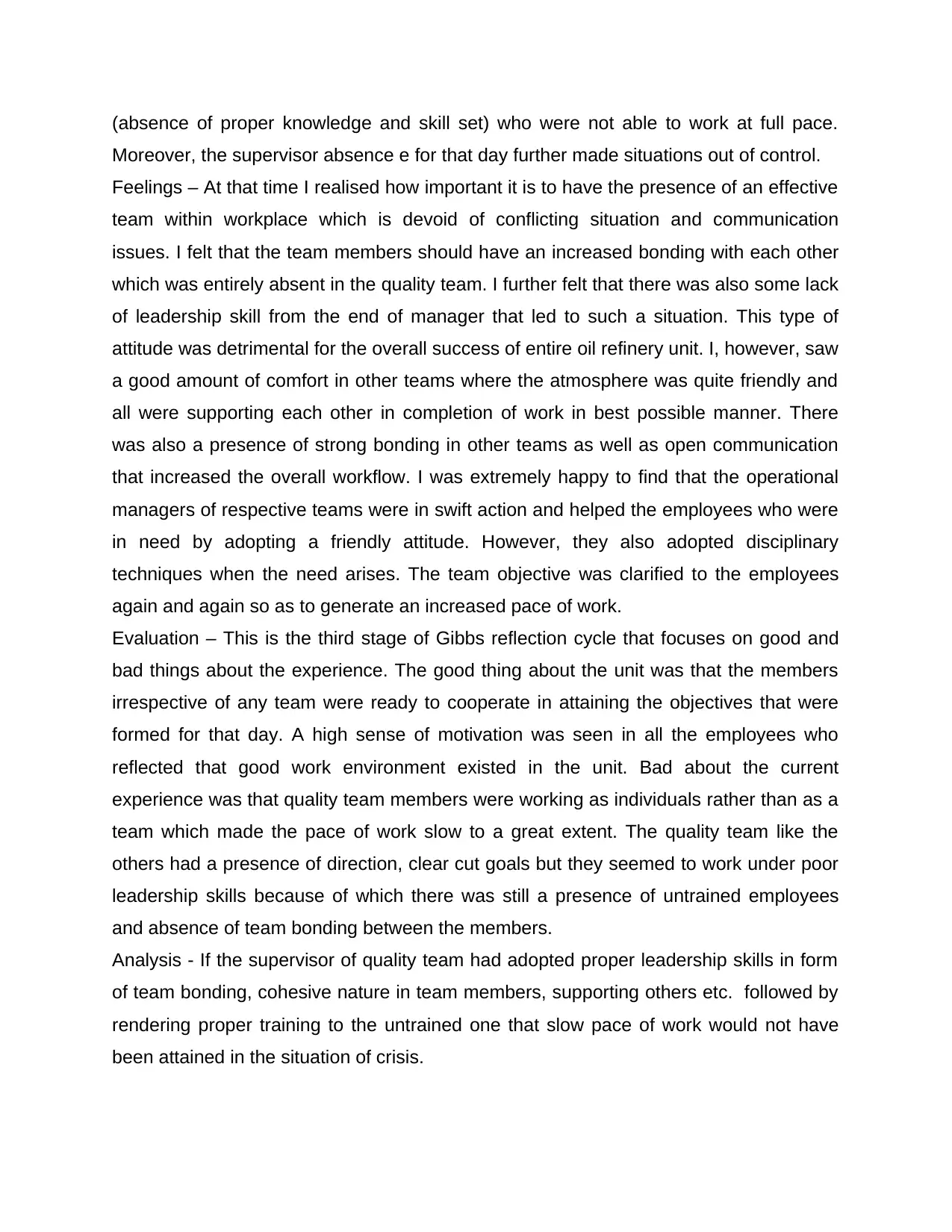
(absence of proper knowledge and skill set) who were not able to work at full pace.
Moreover, the supervisor absence e for that day further made situations out of control.
Feelings – At that time I realised how important it is to have the presence of an effective
team within workplace which is devoid of conflicting situation and communication
issues. I felt that the team members should have an increased bonding with each other
which was entirely absent in the quality team. I further felt that there was also some lack
of leadership skill from the end of manager that led to such a situation. This type of
attitude was detrimental for the overall success of entire oil refinery unit. I, however, saw
a good amount of comfort in other teams where the atmosphere was quite friendly and
all were supporting each other in completion of work in best possible manner. There
was also a presence of strong bonding in other teams as well as open communication
that increased the overall workflow. I was extremely happy to find that the operational
managers of respective teams were in swift action and helped the employees who were
in need by adopting a friendly attitude. However, they also adopted disciplinary
techniques when the need arises. The team objective was clarified to the employees
again and again so as to generate an increased pace of work.
Evaluation – This is the third stage of Gibbs reflection cycle that focuses on good and
bad things about the experience. The good thing about the unit was that the members
irrespective of any team were ready to cooperate in attaining the objectives that were
formed for that day. A high sense of motivation was seen in all the employees who
reflected that good work environment existed in the unit. Bad about the current
experience was that quality team members were working as individuals rather than as a
team which made the pace of work slow to a great extent. The quality team like the
others had a presence of direction, clear cut goals but they seemed to work under poor
leadership skills because of which there was still a presence of untrained employees
and absence of team bonding between the members.
Analysis - If the supervisor of quality team had adopted proper leadership skills in form
of team bonding, cohesive nature in team members, supporting others etc. followed by
rendering proper training to the untrained one that slow pace of work would not have
been attained in the situation of crisis.
Moreover, the supervisor absence e for that day further made situations out of control.
Feelings – At that time I realised how important it is to have the presence of an effective
team within workplace which is devoid of conflicting situation and communication
issues. I felt that the team members should have an increased bonding with each other
which was entirely absent in the quality team. I further felt that there was also some lack
of leadership skill from the end of manager that led to such a situation. This type of
attitude was detrimental for the overall success of entire oil refinery unit. I, however, saw
a good amount of comfort in other teams where the atmosphere was quite friendly and
all were supporting each other in completion of work in best possible manner. There
was also a presence of strong bonding in other teams as well as open communication
that increased the overall workflow. I was extremely happy to find that the operational
managers of respective teams were in swift action and helped the employees who were
in need by adopting a friendly attitude. However, they also adopted disciplinary
techniques when the need arises. The team objective was clarified to the employees
again and again so as to generate an increased pace of work.
Evaluation – This is the third stage of Gibbs reflection cycle that focuses on good and
bad things about the experience. The good thing about the unit was that the members
irrespective of any team were ready to cooperate in attaining the objectives that were
formed for that day. A high sense of motivation was seen in all the employees who
reflected that good work environment existed in the unit. Bad about the current
experience was that quality team members were working as individuals rather than as a
team which made the pace of work slow to a great extent. The quality team like the
others had a presence of direction, clear cut goals but they seemed to work under poor
leadership skills because of which there was still a presence of untrained employees
and absence of team bonding between the members.
Analysis - If the supervisor of quality team had adopted proper leadership skills in form
of team bonding, cohesive nature in team members, supporting others etc. followed by
rendering proper training to the untrained one that slow pace of work would not have
been attained in the situation of crisis.
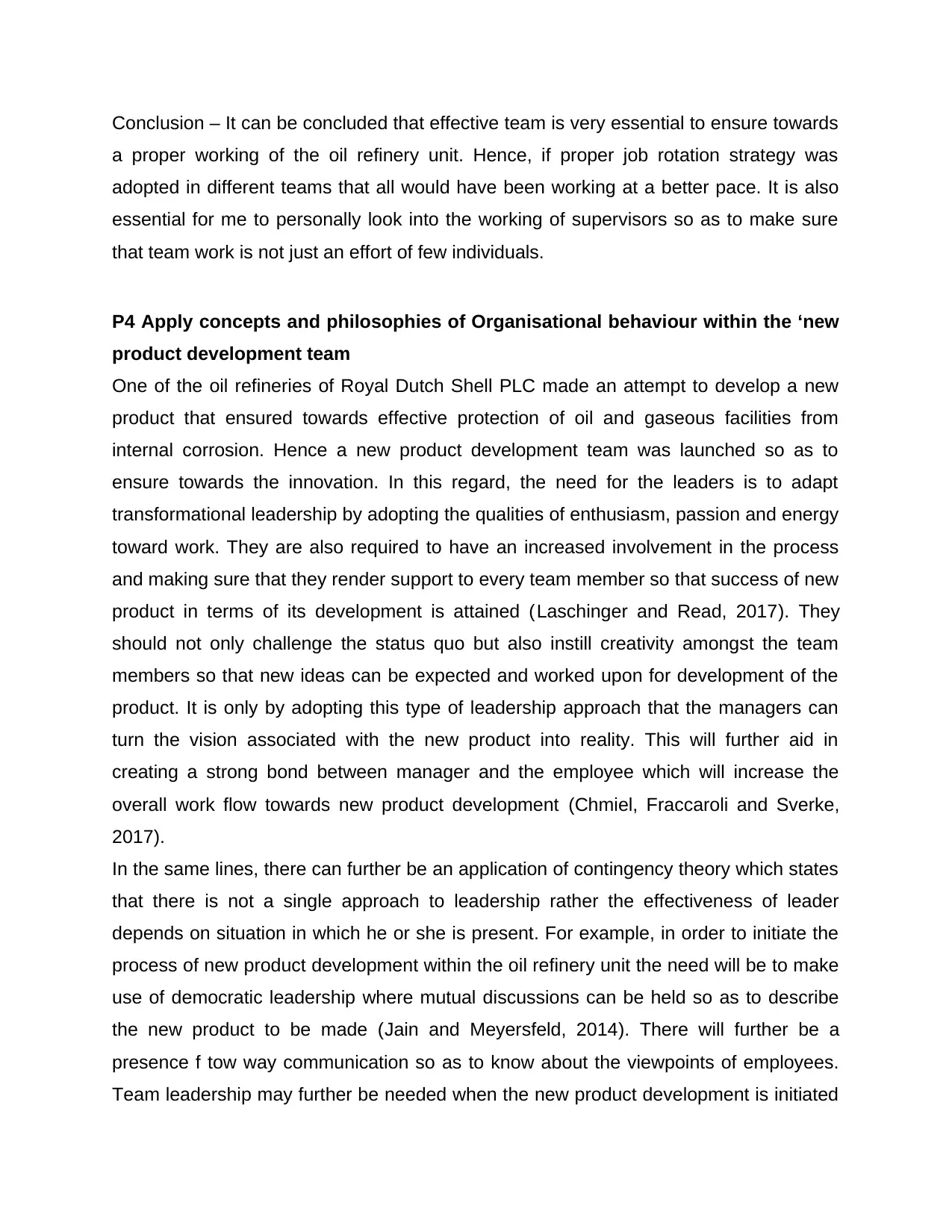
Conclusion – It can be concluded that effective team is very essential to ensure towards
a proper working of the oil refinery unit. Hence, if proper job rotation strategy was
adopted in different teams that all would have been working at a better pace. It is also
essential for me to personally look into the working of supervisors so as to make sure
that team work is not just an effort of few individuals.
P4 Apply concepts and philosophies of Organisational behaviour within the ‘new
product development team
One of the oil refineries of Royal Dutch Shell PLC made an attempt to develop a new
product that ensured towards effective protection of oil and gaseous facilities from
internal corrosion. Hence a new product development team was launched so as to
ensure towards the innovation. In this regard, the need for the leaders is to adapt
transformational leadership by adopting the qualities of enthusiasm, passion and energy
toward work. They are also required to have an increased involvement in the process
and making sure that they render support to every team member so that success of new
product in terms of its development is attained (Laschinger and Read, 2017). They
should not only challenge the status quo but also instill creativity amongst the team
members so that new ideas can be expected and worked upon for development of the
product. It is only by adopting this type of leadership approach that the managers can
turn the vision associated with the new product into reality. This will further aid in
creating a strong bond between manager and the employee which will increase the
overall work flow towards new product development (Chmiel, Fraccaroli and Sverke,
2017).
In the same lines, there can further be an application of contingency theory which states
that there is not a single approach to leadership rather the effectiveness of leader
depends on situation in which he or she is present. For example, in order to initiate the
process of new product development within the oil refinery unit the need will be to make
use of democratic leadership where mutual discussions can be held so as to describe
the new product to be made (Jain and Meyersfeld, 2014). There will further be a
presence f tow way communication so as to know about the viewpoints of employees.
Team leadership may further be needed when the new product development is initiated
a proper working of the oil refinery unit. Hence, if proper job rotation strategy was
adopted in different teams that all would have been working at a better pace. It is also
essential for me to personally look into the working of supervisors so as to make sure
that team work is not just an effort of few individuals.
P4 Apply concepts and philosophies of Organisational behaviour within the ‘new
product development team
One of the oil refineries of Royal Dutch Shell PLC made an attempt to develop a new
product that ensured towards effective protection of oil and gaseous facilities from
internal corrosion. Hence a new product development team was launched so as to
ensure towards the innovation. In this regard, the need for the leaders is to adapt
transformational leadership by adopting the qualities of enthusiasm, passion and energy
toward work. They are also required to have an increased involvement in the process
and making sure that they render support to every team member so that success of new
product in terms of its development is attained (Laschinger and Read, 2017). They
should not only challenge the status quo but also instill creativity amongst the team
members so that new ideas can be expected and worked upon for development of the
product. It is only by adopting this type of leadership approach that the managers can
turn the vision associated with the new product into reality. This will further aid in
creating a strong bond between manager and the employee which will increase the
overall work flow towards new product development (Chmiel, Fraccaroli and Sverke,
2017).
In the same lines, there can further be an application of contingency theory which states
that there is not a single approach to leadership rather the effectiveness of leader
depends on situation in which he or she is present. For example, in order to initiate the
process of new product development within the oil refinery unit the need will be to make
use of democratic leadership where mutual discussions can be held so as to describe
the new product to be made (Jain and Meyersfeld, 2014). There will further be a
presence f tow way communication so as to know about the viewpoints of employees.
Team leadership may further be needed when the new product development is initiated
⊘ This is a preview!⊘
Do you want full access?
Subscribe today to unlock all pages.

Trusted by 1+ million students worldwide
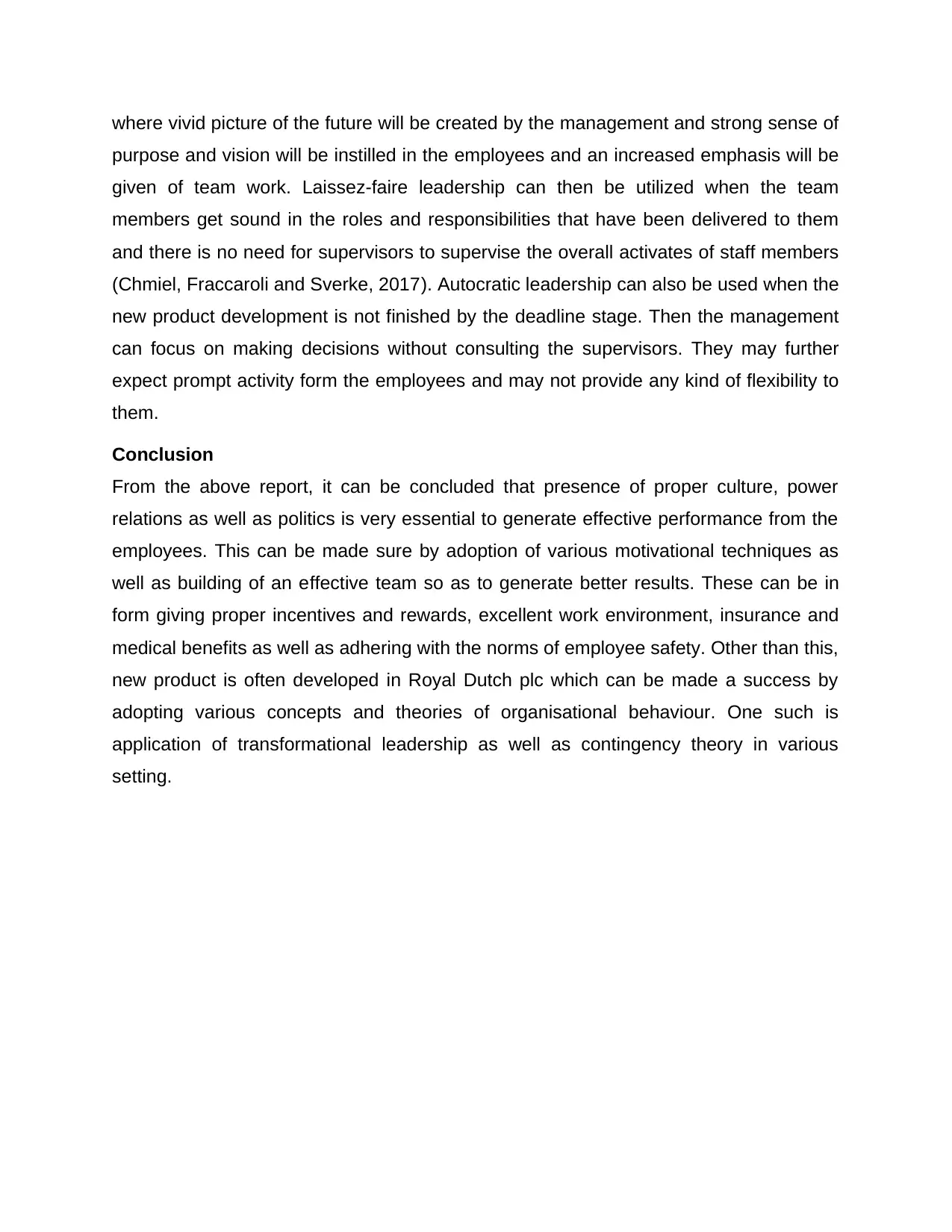
where vivid picture of the future will be created by the management and strong sense of
purpose and vision will be instilled in the employees and an increased emphasis will be
given of team work. Laissez-faire leadership can then be utilized when the team
members get sound in the roles and responsibilities that have been delivered to them
and there is no need for supervisors to supervise the overall activates of staff members
(Chmiel, Fraccaroli and Sverke, 2017). Autocratic leadership can also be used when the
new product development is not finished by the deadline stage. Then the management
can focus on making decisions without consulting the supervisors. They may further
expect prompt activity form the employees and may not provide any kind of flexibility to
them.
Conclusion
From the above report, it can be concluded that presence of proper culture, power
relations as well as politics is very essential to generate effective performance from the
employees. This can be made sure by adoption of various motivational techniques as
well as building of an effective team so as to generate better results. These can be in
form giving proper incentives and rewards, excellent work environment, insurance and
medical benefits as well as adhering with the norms of employee safety. Other than this,
new product is often developed in Royal Dutch plc which can be made a success by
adopting various concepts and theories of organisational behaviour. One such is
application of transformational leadership as well as contingency theory in various
setting.
purpose and vision will be instilled in the employees and an increased emphasis will be
given of team work. Laissez-faire leadership can then be utilized when the team
members get sound in the roles and responsibilities that have been delivered to them
and there is no need for supervisors to supervise the overall activates of staff members
(Chmiel, Fraccaroli and Sverke, 2017). Autocratic leadership can also be used when the
new product development is not finished by the deadline stage. Then the management
can focus on making decisions without consulting the supervisors. They may further
expect prompt activity form the employees and may not provide any kind of flexibility to
them.
Conclusion
From the above report, it can be concluded that presence of proper culture, power
relations as well as politics is very essential to generate effective performance from the
employees. This can be made sure by adoption of various motivational techniques as
well as building of an effective team so as to generate better results. These can be in
form giving proper incentives and rewards, excellent work environment, insurance and
medical benefits as well as adhering with the norms of employee safety. Other than this,
new product is often developed in Royal Dutch plc which can be made a success by
adopting various concepts and theories of organisational behaviour. One such is
application of transformational leadership as well as contingency theory in various
setting.
Paraphrase This Document
Need a fresh take? Get an instant paraphrase of this document with our AI Paraphraser
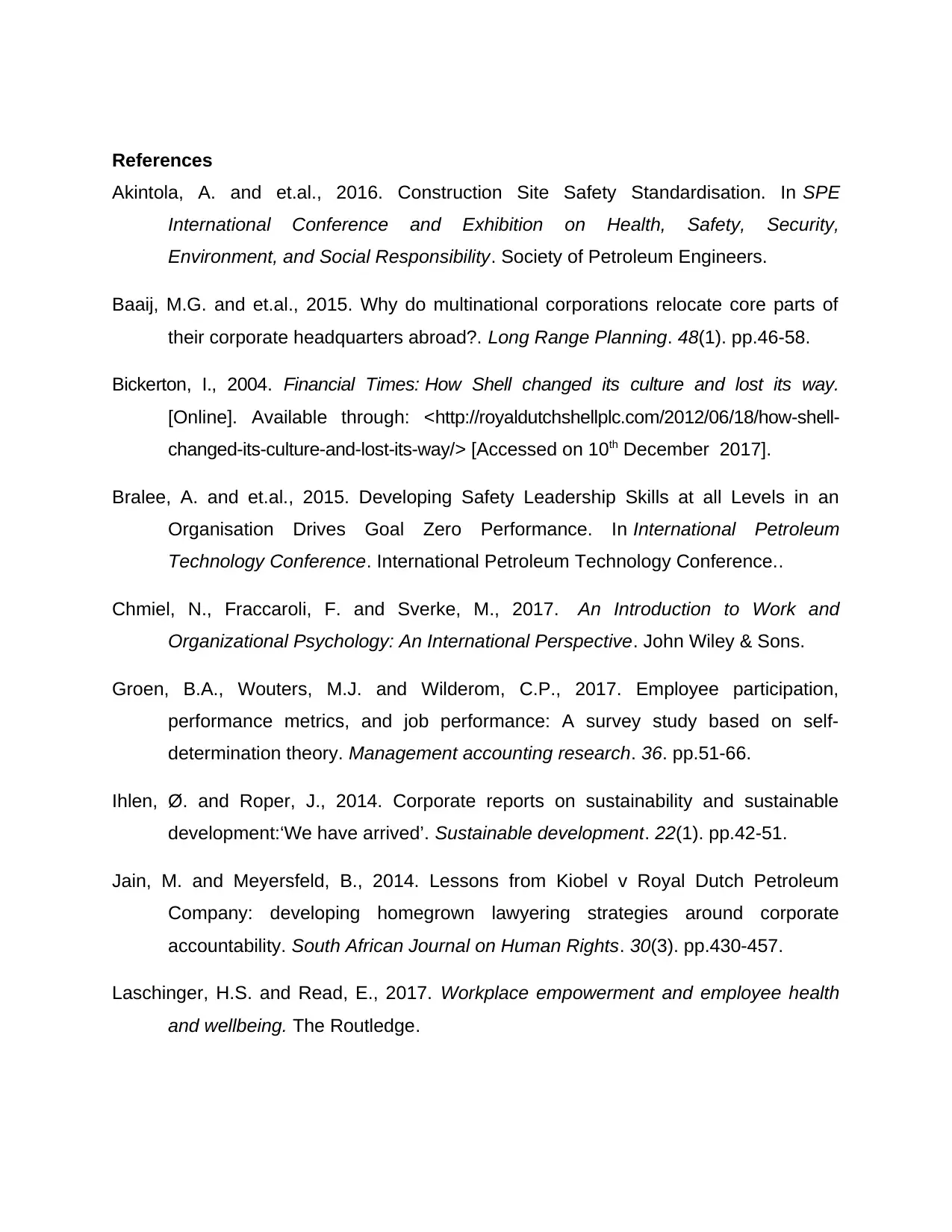
References
Akintola, A. and et.al., 2016. Construction Site Safety Standardisation. In SPE
International Conference and Exhibition on Health, Safety, Security,
Environment, and Social Responsibility. Society of Petroleum Engineers.
Baaij, M.G. and et.al., 2015. Why do multinational corporations relocate core parts of
their corporate headquarters abroad?. Long Range Planning. 48(1). pp.46-58.
Bickerton, I., 2004. Financial Times: How Shell changed its culture and lost its way.
[Online]. Available through: <http://royaldutchshellplc.com/2012/06/18/how-shell-
changed-its-culture-and-lost-its-way/> [Accessed on 10th December 2017].
Bralee, A. and et.al., 2015. Developing Safety Leadership Skills at all Levels in an
Organisation Drives Goal Zero Performance. In International Petroleum
Technology Conference. International Petroleum Technology Conference..
Chmiel, N., Fraccaroli, F. and Sverke, M., 2017. An Introduction to Work and
Organizational Psychology: An International Perspective. John Wiley & Sons.
Groen, B.A., Wouters, M.J. and Wilderom, C.P., 2017. Employee participation,
performance metrics, and job performance: A survey study based on self-
determination theory. Management accounting research. 36. pp.51-66.
Ihlen, Ø. and Roper, J., 2014. Corporate reports on sustainability and sustainable
development:‘We have arrived’. Sustainable development. 22(1). pp.42-51.
Jain, M. and Meyersfeld, B., 2014. Lessons from Kiobel v Royal Dutch Petroleum
Company: developing homegrown lawyering strategies around corporate
accountability. South African Journal on Human Rights. 30(3). pp.430-457.
Laschinger, H.S. and Read, E., 2017. Workplace empowerment and employee health
and wellbeing. The Routledge.
Akintola, A. and et.al., 2016. Construction Site Safety Standardisation. In SPE
International Conference and Exhibition on Health, Safety, Security,
Environment, and Social Responsibility. Society of Petroleum Engineers.
Baaij, M.G. and et.al., 2015. Why do multinational corporations relocate core parts of
their corporate headquarters abroad?. Long Range Planning. 48(1). pp.46-58.
Bickerton, I., 2004. Financial Times: How Shell changed its culture and lost its way.
[Online]. Available through: <http://royaldutchshellplc.com/2012/06/18/how-shell-
changed-its-culture-and-lost-its-way/> [Accessed on 10th December 2017].
Bralee, A. and et.al., 2015. Developing Safety Leadership Skills at all Levels in an
Organisation Drives Goal Zero Performance. In International Petroleum
Technology Conference. International Petroleum Technology Conference..
Chmiel, N., Fraccaroli, F. and Sverke, M., 2017. An Introduction to Work and
Organizational Psychology: An International Perspective. John Wiley & Sons.
Groen, B.A., Wouters, M.J. and Wilderom, C.P., 2017. Employee participation,
performance metrics, and job performance: A survey study based on self-
determination theory. Management accounting research. 36. pp.51-66.
Ihlen, Ø. and Roper, J., 2014. Corporate reports on sustainability and sustainable
development:‘We have arrived’. Sustainable development. 22(1). pp.42-51.
Jain, M. and Meyersfeld, B., 2014. Lessons from Kiobel v Royal Dutch Petroleum
Company: developing homegrown lawyering strategies around corporate
accountability. South African Journal on Human Rights. 30(3). pp.430-457.
Laschinger, H.S. and Read, E., 2017. Workplace empowerment and employee health
and wellbeing. The Routledge.
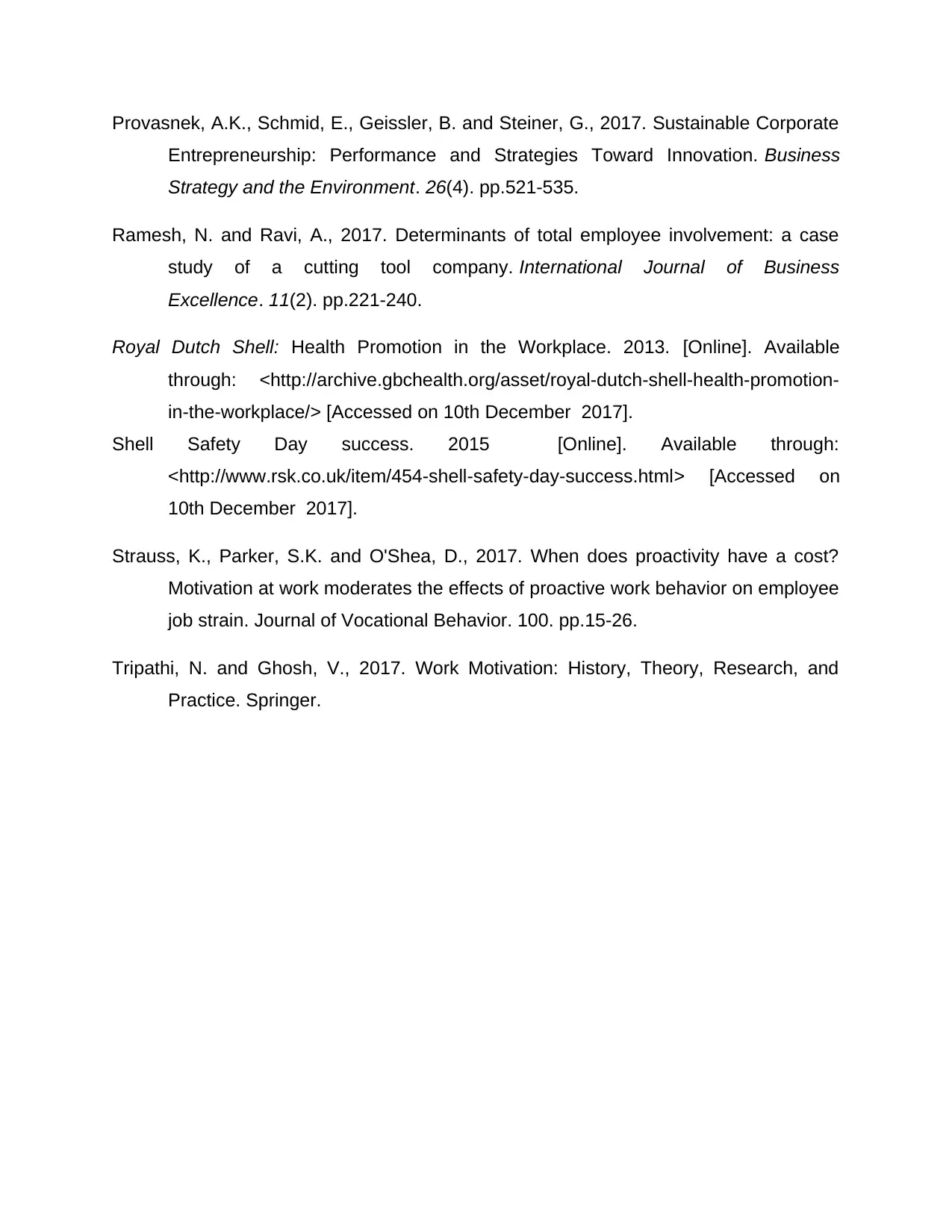
Provasnek, A.K., Schmid, E., Geissler, B. and Steiner, G., 2017. Sustainable Corporate
Entrepreneurship: Performance and Strategies Toward Innovation. Business
Strategy and the Environment. 26(4). pp.521-535.
Ramesh, N. and Ravi, A., 2017. Determinants of total employee involvement: a case
study of a cutting tool company. International Journal of Business
Excellence. 11(2). pp.221-240.
Royal Dutch Shell: Health Promotion in the Workplace. 2013. [Online]. Available
through: <http://archive.gbchealth.org/asset/royal-dutch-shell-health-promotion-
in-the-workplace/> [Accessed on 10th December 2017].
Shell Safety Day success. 2015 [Online]. Available through:
<http://www.rsk.co.uk/item/454-shell-safety-day-success.html> [Accessed on
10th December 2017].
Strauss, K., Parker, S.K. and O'Shea, D., 2017. When does proactivity have a cost?
Motivation at work moderates the effects of proactive work behavior on employee
job strain. Journal of Vocational Behavior. 100. pp.15-26.
Tripathi, N. and Ghosh, V., 2017. Work Motivation: History, Theory, Research, and
Practice. Springer.
Entrepreneurship: Performance and Strategies Toward Innovation. Business
Strategy and the Environment. 26(4). pp.521-535.
Ramesh, N. and Ravi, A., 2017. Determinants of total employee involvement: a case
study of a cutting tool company. International Journal of Business
Excellence. 11(2). pp.221-240.
Royal Dutch Shell: Health Promotion in the Workplace. 2013. [Online]. Available
through: <http://archive.gbchealth.org/asset/royal-dutch-shell-health-promotion-
in-the-workplace/> [Accessed on 10th December 2017].
Shell Safety Day success. 2015 [Online]. Available through:
<http://www.rsk.co.uk/item/454-shell-safety-day-success.html> [Accessed on
10th December 2017].
Strauss, K., Parker, S.K. and O'Shea, D., 2017. When does proactivity have a cost?
Motivation at work moderates the effects of proactive work behavior on employee
job strain. Journal of Vocational Behavior. 100. pp.15-26.
Tripathi, N. and Ghosh, V., 2017. Work Motivation: History, Theory, Research, and
Practice. Springer.
⊘ This is a preview!⊘
Do you want full access?
Subscribe today to unlock all pages.

Trusted by 1+ million students worldwide
1 out of 12
Related Documents
Your All-in-One AI-Powered Toolkit for Academic Success.
+13062052269
info@desklib.com
Available 24*7 on WhatsApp / Email
![[object Object]](/_next/static/media/star-bottom.7253800d.svg)
Unlock your academic potential
Copyright © 2020–2026 A2Z Services. All Rights Reserved. Developed and managed by ZUCOL.





